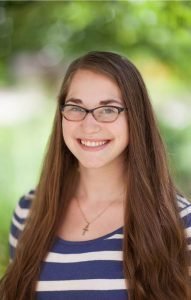Nanotechnology at Northwestern
Meet Suzanne Neidhart, a postdoctoral fellow in the Schatz Group
July 24, 2020
Suzanne Neidhart is a second year postdoctoral fellow in the Schatz Group, whose research involves theory and computation as applied to problems in nanotechnology, properties of materials, and related areas. She is originally from Wichita, KS.
 Where did you complete your undergraduate/graduate degree?
Where did you complete your undergraduate/graduate degree?
I received my BS in Chemistry from Newman University, a small liberal arts school in Wichita. I received my PhD in Chemistry from the University of Notre Dame under the direction of Prof. J.D. Gezelter.
When did you first become interested in chemistry?
In high school the only class that I found truly difficult was chemistry; this is how I became transfixed on trying to understand chemistry. It was at my small undergraduate department, where I had a lot of one-on-one meetings with professors, that I was introduced to basic research.
How do you explain what you study to non-scientists?
My primary project is working on auto-regulatory materials, materials that take in light and respond with a different measurable, such as mechanical. The material can then return to the original state and be reused in measurements.
What are some potential applications for your work?
These materials use reversible mechanical properties that can be used in a sensing process for external environmental conditions, including humidity, temperature, light, and pH.
What has been a highlight of your time at Northwestern?
There has not been a singular moment or event that would be considered the highlight, but rather the building of interdisciplinary projects across the departments and the ability to research exciting materials.
What has been the most challenging aspect of your work or your time here?
Learning new techniques of engineering and chemistry subfields in order to better be able to explore the experimental systems.
Can you tell me about your experiences either being mentored or mentoring others as a scientist?
The Schatz Group has graduate students and postdocs with a wide variety of expertise, thus it has been a great environment to figure out how to approach a difficult question. Due to the broad range of topics handled in the group there is a collaborative environment where the group can ask questions to help strengthen each others’ research.
What are your hobbies outside of the lab?
Outside of the lab, I enjoy playing board games and cooking.